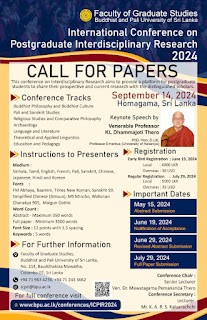The
Concept of Solitude in the Theravada Tripitaka: Exploring Its Role in
Alleviating Loneliness
Nandiya Bhikkhu
Buddhist teachings elaborate on
three types of solitude: physical isolation, the experience of loneliness, and
the attainment of tranquility in peaceful settings. Physical isolation involves
being alone in a specific location or situation, while inner loneliness is the
subjective feeling of isolation and disconnectedness. Tranquility is achieved
through deliberate living or meditation practice, promoting a state of inner
peace. Understanding these concepts within the framework of Theravada Buddhism
offers valuable insights into addressing the pervasive issue of loneliness,
which has significant implications for mental health.
This study explores the role of
solitude as depicted in the Theravada Tripitaka and examines how Buddhist
meditation practices can alleviate feelings of loneliness. By analyzing the
conditions, emotions, and meditation methods prescribed in Buddhist teachings,
the research seeks to demonstrate the practical applications of these practices
in contemporary life to enhance mental well-being.
The research involves a
comprehensive analysis of primary Buddhist texts, the Theravada Tripitaka, and
a review of scholarly studies and first-hand accounts. The study focuses on the
meditation techniques and practices recommended for achieving solitude and
inner peace. Practical applications such as mindful breathing and locating
peaceful areas for introspection are examined to understand their effectiveness
in reducing loneliness.
The analysis reveals that
Buddhist meditation practices offer substantial benefits for mitigating the
negative effects of loneliness. Techniques such as mindfulness and meditation
help individuals develop a stronger connection with themselves, thereby
reducing feelings of loneliness. The study highlights the therapeutic potential
of these practices, demonstrating that they can serve as effective strategies
for overcoming loneliness and promoting mental health.
This paper contributes to
understanding Theravada Buddhism's perspectives on isolation and solitude. The
findings indicate that meditation practices within the Theravada tradition can
significantly alleviate loneliness, providing practical approaches for improving
mental well-being. By incorporating mindfulness and meditation into their daily
lives, individuals can enhance their mental health and cultivate inner peace.
Keywords: loneliness, meditation,
psychology, solitude, Theravada Tripitaka.




No comments:
Post a Comment